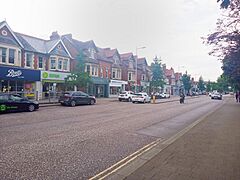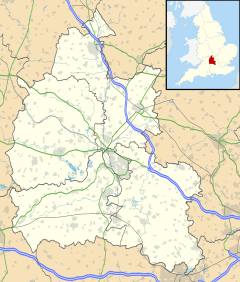Summertown, Oxford facts for kids
Quick facts for kids Summertown |
|
|---|---|
 Summertown Parade on Banbury Road |
|
| OS grid reference | SP5008 |
| Civil parish |
|
| District | |
| Shire county | |
| Region | |
| Country | England |
| Sovereign state | United Kingdom |
| Post town | Oxford |
| Postcode district | OX2 |
| Dialling code | 01865 |
| Police | Thames Valley |
| Fire | Oxfordshire |
| Ambulance | South Central |
| EU Parliament | South East England |
| UK Parliament |
|
| Website | Oxford City Council |
Summertown is a lively area in North Oxford, England. It's a suburb of the famous city of Oxford. This area is about one mile square and is located north of St Giles, which is a main road leading out of Oxford's city centre.
Summertown is known for its many independent schools and some of the most expensive houses in the city. You'll find lots of popular shops along both sides of Banbury Road. There's also a smaller street called South Parade with more shops and restaurants. This street connects Banbury Road and Woodstock Road.
This area is also a hub for Oxford's broadcast media. BBC Radio Oxford and the BBC Television studios for Oxford are on Banbury Road. You can also find the studios for JACK FM and Glide FM on Woodstock Road.
Contents
History of Summertown
Most of North Oxford, including Summertown, started to grow a lot after 1877. This was when Oxford University made a big change. They decided to let college teachers, called fellows, get married and live in proper houses. Before this, they usually had to live in rooms inside their colleges.
Because of this new rule, many large houses were built on farmland. These houses were located on both sides of Banbury Road and Woodstock Road. A lot of this land belonged to St John's College, Oxford. The houses were first sold with a special type of ownership called leasehold. This meant people owned the house for a set time, but not the land it sat on. Over time, St John's College has sold the full ownership, or freehold, for most of these properties.
Churches in Summertown
Summertown has several churches for different Christian groups.
Church of England
The main Church of England parish church in Summertown is Saint Michael and All Angels. It's located on Lonsdale Road. This church was built between 1908 and 1909. It replaced an older church called Saint John the Baptist, which was built in 1832. The new church, St. Michael's, was designed in a Gothic Revival style. It has a special shape like a cross, but it has never been fully finished.
Other Christian Churches
- A nonconformist chapel in Middle Way opened in 1824. It has been a Spiritualist church since 1967.
- Summertown United Reformed Church started as a mission in 1838. Its current church building on Banbury Road was built in 1894.
- Woodstock Road Baptist Church opened in 1897 and was rebuilt in 1955.
Roman Catholic Church
The Roman Catholic Parish church of Saints Gregory and Augustine is on Woodstock Road. It was founded in 1911. The church was designed by Ernest Newton, who was a well-known architect from the Arts and Crafts movement. The building still looks very much like it did when it was first built.
Getting Around: Public Transport
Summertown has good public transport links, mainly by bus. In 1898, horse trams used to run on Banbury Road all the way to Summertown. By 1913, these horse trams were replaced by motor buses.
Today, many bus services connect central Oxford with Summertown along Banbury Road. These include routes run by the Oxford Bus Company and Stagecoach. There are also special Park and Ride bus services. These link Water Eaton with central Oxford and the John Radcliffe Hospital. Since 2011, the Oxford Bus Company and Stagecoach have worked together. They share the same bus timetable, which makes it easier for people to travel. You can also use the same ticket or bus pass on buses from both companies.
Schools and Colleges
Summertown is home to many different schools and colleges:
- Cherwell School: This is the main secondary school for the area.
- MECO Islamic School: A Saturday Islamic School for children aged 4–16, located at Cherwell School.
- St. Clare's, Oxford: An independent, international college offering the International Baccalaureate Diploma.
- St Edward's School: An independent boarding school for students aged 13-18.
- d'Overbroeck's College: An independent Sixth Form college.
- Summer Fields School: An independent preparatory school for boys aged 8-13.
- Dragon School: An independent boarding and day school for children aged 4-13.
- Northern House School: A school for special needs education.
- Oxford High School: An independent school for girls aged 11-18.
- Saint Philip and James Primary School: A Church of England Primary School.
- Ewert House: Part of the University of Oxford, used for lectures and exams.
- Wolfson College: One of the colleges of Oxford University.
- Magna Carta College: A college located on Mayfield Road.
Famous People from Summertown
Many interesting and famous people have lived in Summertown:
- John Bayley: A writer and literary critic.
- Colin Dexter: The author who wrote the popular Inspector Morse novels.
- Margaret Gowing: A leading academic and the first Professor of the History of Science at Oxford University.
- J.B.S. Haldane: A famous geneticist and evolutionary biologist.
- John Scott Haldane: A physiologist known for trying out experiments on himself.
- Leszek Kołakowski: A well-known philosopher.
- Naomi Mitchison: A novelist and poet.
- Desmond Morris: A zoologist and expert on human and animal behavior.
- Dame Iris Murdoch: A highly respected author and philosopher.
- James Murray: A very important person in language, who worked on the Oxford English Dictionary.
- Yannis Philippakis: A musician from the band Foals.
- Sir Adam Roberts: An academic expert in international relations.
- Sir Francis Simon: A leading physical chemist and physicist.
- J.R.R Tolkien: The famous author of The Hobbit and The Lord of the Rings.
- Tom Ward: An actor known for his role in the BBC drama Silent Witness.
- Athol Williams: An award-winning poet and philosopher.
- Katherine J. Willis, Baroness Willis of Summertown: A biologist and a member of the House of Lords.
- Sir Martin Wood: Co-founder of Oxford Instruments, a science technology company.
- Thom Yorke: A musician from the band Radiohead.
 | Aaron Henry |
 | T. R. M. Howard |
 | Jesse Jackson |


